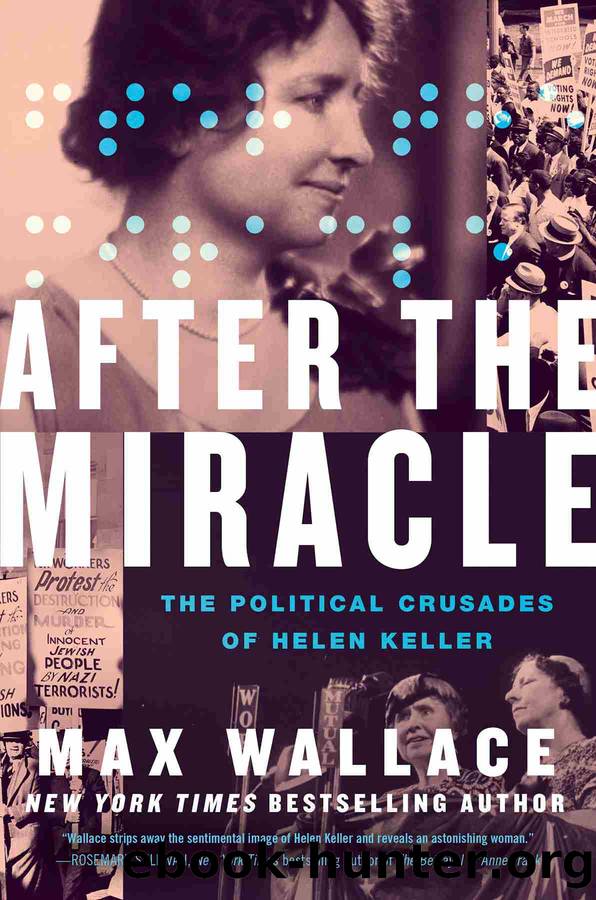After the Miracle by Max Wallace

Author:Max Wallace [WALLACE, MAX]
Language: eng
Format: epub
Publisher: Grand Central Publishing
Published: 2023-04-11T00:00:00+00:00
Even as she closely followed world events, Helen continued to read voraciously the novels and poetry that she had loved since she was young. Like millions of Americans, she was captivated by Margaret Mitchellâs 1936 bestseller Gone with the Windâthe epic story set in Civil War and Reconstruction-era Georgia. It stirred in Helen a ânostalgia for the drowsy sweet, spring and early summer days in Tuscumbiaâ and its depiction of African Americans reminded her of her Black playmates âwho so good-naturedly played with the insatiate tomboy that I was.â But as she often did when memories of her childhood turned idyllic, she summoned the harsher reality that she also remembered well: âSadly I recall the degrading poverty, the ignorance and superstition into which those little ones were born and the bitterness of the Negro problem through which many of them are still living.â47
In a 1938 interview with the Kansas City African American newspaper The Call, she was even more explicit about her feelings. After discussing her personal friendship with the noted Harlem Renaissance poet Countee Cullen, she was asked whether she believed the United States could wield moral influence as long as it tolerated âlynchings and prejudice.â As Polly spelled out the word âlynchingsâ into her palm, the reporter noted a âperceptible sign of horrorâ come over Helenâs face. âI am ashamed in my soul over it all,â she declared, invoking the kind of language and tone that had been largely missing from her public utterances about American politics since the days of her public involvement with the Socialist Party and the IWW. She added that the United States would yield far more influence if it âcould stand before the world with a clean record of justice and humanity for all its people.â48
And while the issue of anti-Black racism continued to hit home, she soon demonstrated that she was equally indignant at discrimination against other marginalized groups. In July 1939, shortly after she bought an estate in Westport, Connecticut, that she named Arcan Ridge, she received notice that she had been âadoptedâ as an honorary member of the Stoney Indian Nationâan honor frequently granted to prominent figures such as movie stars and politicians. Traditionally, celebrities offered only platitudes when this honor was bestowed. But at the ceremony accepting her membership, Helen took the opportunity to speak out about an issue rarely discussed during this era when Native people were still routinely portrayed as âsavagesâ in popular books and movies. âSince my childhood,â she told the tribe, âI have read all I could find about the Indians, and my cheeks have burned with shame at the terrible wrongs the white man has done them and his violence against the peaceable disciples of the Great Spirit.â49
After a long period during which Helen had rarely spoken out around any issue unrelated to her AFB advocacy work, it was clear that something had changed. A few years earlier, Helen had informed Major Migel that her working relationship with the AFB was causing her âfriction and unhappiness.
Download
This site does not store any files on its server. We only index and link to content provided by other sites. Please contact the content providers to delete copyright contents if any and email us, we'll remove relevant links or contents immediately.
Down the Drain by Julia Fox(963)
The Light We Carry by Michelle Obama(879)
Cher by Cher(788)
Simple Passion by Annie Ernaux(735)
Love, Pamela by Pamela Anderson(594)
Zen Under Fire by Marianne Elliott(556)
The Nazis Knew My Name by Magda Hellinger & Maya Lee(540)
You're That Bitch by Bretman Rock(540)
Novelist as a Vocation by Haruki Murakami(530)
The Foxfire Book of Appalachian Women by Kami Ahrens(518)
Alone Together: Sailing Solo to Hawaii and Beyond by Christian Williams(515)
Kamala Harris by Chidanand Rajghatta(490)
Gambling Man by Lionel Barber(472)
The Barn by Wright Thompson(429)
Drinking Games by Sarah Levy(416)
Limitless by Mallory Weggemann(409)
A Renaissance of Our Own by Rachel E. Cargle(405)
Memoirs of an Indian Woman by Shudha Mazumdar Geraldine Hancock Forbes(403)
A new method to evaluate the dose-effect relationship of a TCM formula Gegen Qinlian Decoction: âFocusâ mode of integrated biomarkers by unknow(396)
